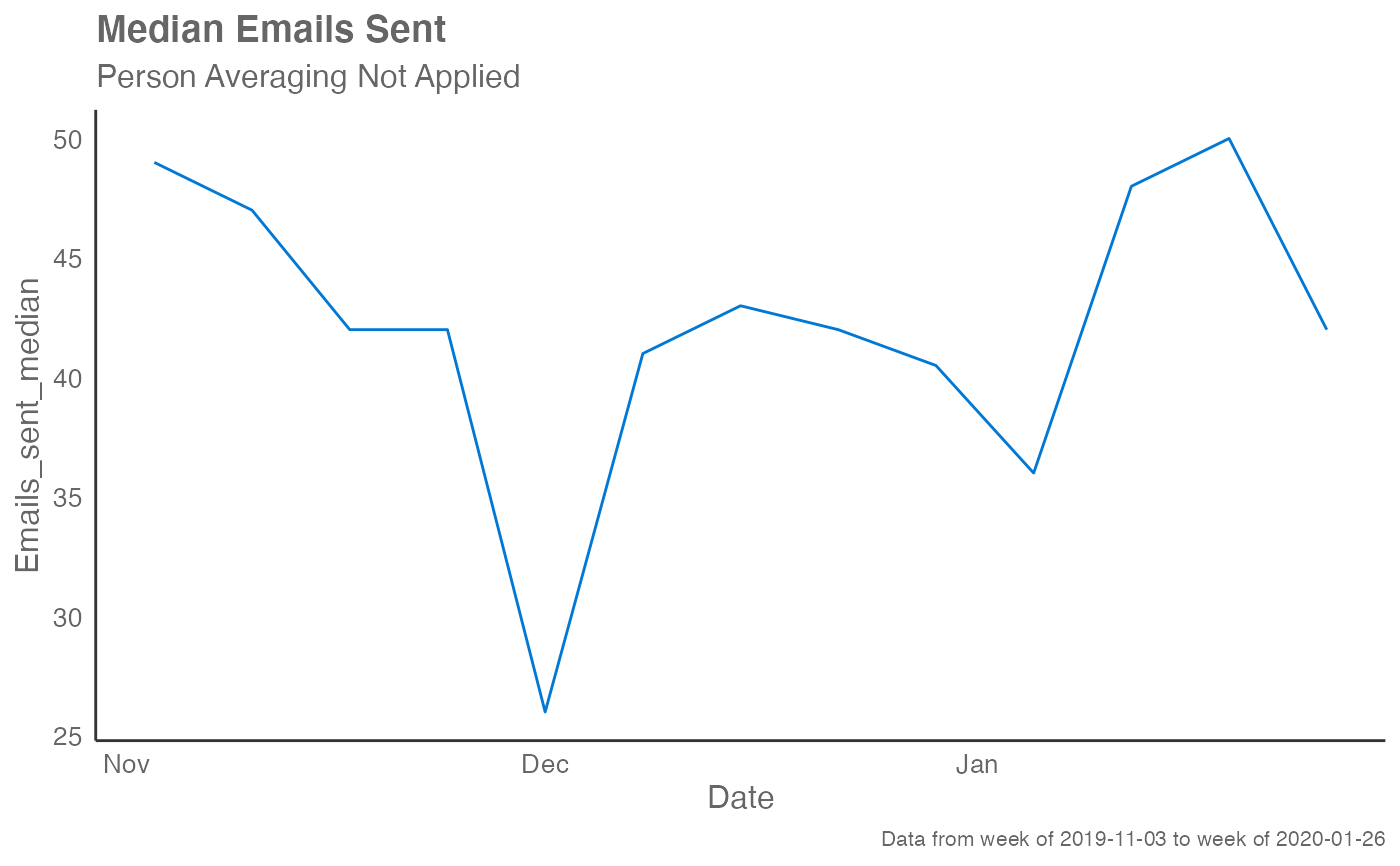Create a line chart without aggregation for any metric
Source:R/create_line_asis.R
create_line_asis.RdThis function creates a line chart directly from the aggregated / summarised data.
Unlike create_line() which performs a person-level aggregation, there is no
calculation for create_line_asis() and the values are rendered as they are passed
into the function. The only requirement is that a date_var is provided for the x-axis.
create_line_asis(
data,
date_var = "Date",
metric,
title = NULL,
subtitle = NULL,
caption = NULL,
ylab = date_var,
xlab = metric,
line_colour = rgb2hex(0, 120, 212)
)Arguments
- data
Plotting data as a data frame.
- date_var
String containing name of variable for the horizontal axis.
- metric
String containing name of variable representing the line.
- title
Title of the plot.
- subtitle
Subtitle of the plot.
- caption
Caption of the plot.
- ylab
Y-axis label for the plot (group axis)
- xlab
X-axis label of the plot (bar axis).
- line_colour
String to specify colour to use for the line. Hex codes are accepted. You can also supply RGB values via
rgb2hex().
Value
Returns a 'ggplot' object representing a line plot.
See also
Other Visualization:
afterhours_dist(),
afterhours_fizz(),
afterhours_line(),
afterhours_rank(),
afterhours_summary(),
afterhours_trend(),
collaboration_area(),
collaboration_dist(),
collaboration_fizz(),
collaboration_line(),
collaboration_rank(),
collaboration_sum(),
collaboration_trend(),
create_bar(),
create_bar_asis(),
create_boxplot(),
create_bubble(),
create_dist(),
create_fizz(),
create_inc(),
create_line(),
create_period_scatter(),
create_rank(),
create_sankey(),
create_scatter(),
create_stacked(),
create_tracking(),
create_trend(),
email_dist(),
email_fizz(),
email_line(),
email_rank(),
email_summary(),
email_trend(),
external_dist(),
external_fizz(),
external_line(),
external_network_plot(),
external_rank(),
external_sum(),
hr_trend(),
hrvar_count(),
hrvar_trend(),
internal_network_plot(),
keymetrics_scan(),
meeting_dist(),
meeting_fizz(),
meeting_line(),
meeting_quality(),
meeting_rank(),
meeting_summary(),
meeting_trend(),
meetingtype_dist(),
meetingtype_dist_ca(),
meetingtype_dist_mt(),
meetingtype_summary(),
mgrcoatt_dist(),
mgrrel_matrix(),
one2one_dist(),
one2one_fizz(),
one2one_freq(),
one2one_line(),
one2one_rank(),
one2one_sum(),
one2one_trend(),
period_change(),
workloads_dist(),
workloads_fizz(),
workloads_line(),
workloads_rank(),
workloads_summary(),
workloads_trend(),
workpatterns_area(),
workpatterns_rank()
Other Flexible:
create_bar(),
create_bar_asis(),
create_boxplot(),
create_bubble(),
create_density(),
create_dist(),
create_fizz(),
create_hist(),
create_inc(),
create_line(),
create_period_scatter(),
create_rank(),
create_sankey(),
create_scatter(),
create_stacked(),
create_tracking(),
create_trend(),
period_change()
Other Time-series:
IV_by_period(),
create_line(),
create_period_scatter(),
create_trend(),
period_change()
Examples
library(dplyr)
# Median `Emails_sent` grouped by `Date`
# Without Person Averaging
med_df <-
sq_data %>%
group_by(Date) %>%
summarise(Emails_sent_median = median(Emails_sent))
med_df %>%
create_line_asis(
date_var = "Date",
metric = "Emails_sent_median",
title = "Median Emails Sent",
subtitle = "Person Averaging Not Applied",
caption = extract_date_range(sq_data, return = "text")
)
